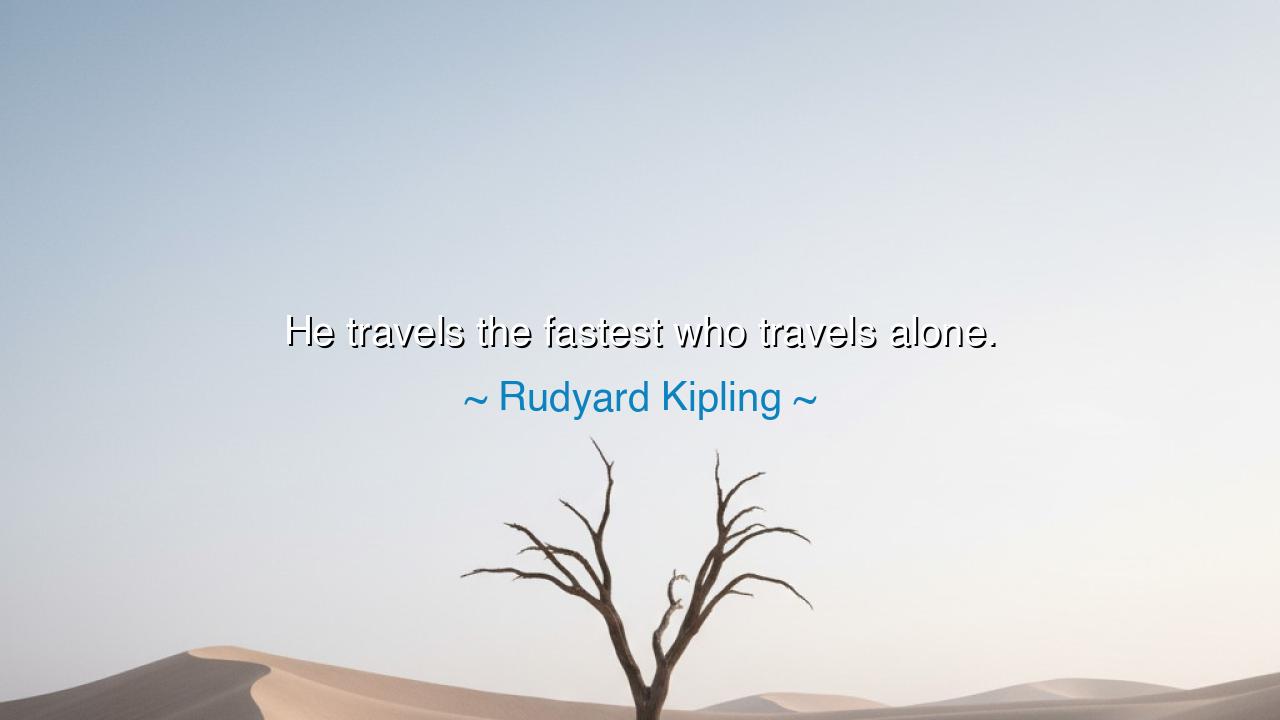
He travels the fastest who travels alone.






When Rudyard Kipling wrote, “He travels the fastest who travels alone,” he was not only speaking of the pace of a traveler, but of the burden of companionship, of the freedom and loneliness that come with self-reliance. His words, though simple, are heavy with wisdom — a truth born from the long roads of life. To walk alone is to move unbound, unburdened by the needs, fears, or hesitations of others. Yet it is also to walk in silence, to bear the chill of solitude and the weight of one’s own heart. Kipling, the poet of empire and wanderer of worlds, understood both the freedom and the cost of independence. His line is not a command, but a meditation — a recognition of what is gained and what is lost when one chooses the solitary path.
Kipling was a man shaped by travel — born in India, educated in England, and carried by his pen across continents. In his poem The Winners, from which this quote arises, he reflects on the nature of duty, sacrifice, and the loneliness of those who must bear responsibility. The traveler who goes alone, he implies, moves swiftly because he carries no one else’s weight. He answers to no companion’s pace, no group’s hesitation, no shared decision. He is master of his own path. But Kipling, who knew the bitterness of exile and the ache of distance, also knew that such swiftness often comes at a price: speed without fellowship, achievement without warmth. The line stands as both an observation and a warning — that independence, though powerful, can turn cold if it becomes isolation.
The ancients, too, spoke of this duality. In the desert, the Bedouin traveler could survive only by moving swiftly and lightly, carrying little, walking alone beneath the burning sun. But even he knew that no man could endure the desert forever without water, and no heart could endure it without love. The philosopher Aristotle wrote that “he who lives alone must be either a beast or a god,” for man is by nature a social being, born to live among his kind. Kipling’s traveler, then, might be swift — but he also stands apart, half-beast in his endurance, half-god in his independence. His road is clear but lonely, his victories great but unshared.
Yet, there are moments in life when this path must be taken — moments when one must walk alone because others cannot follow. The inventor, the visionary, the reformer, the soldier on a mission — all know the truth of Kipling’s words. Nikola Tesla, the genius who dreamed of lighting the world, worked in solitude, misunderstood and often mocked. His mind raced ahead of his time, and his loneliness became both his freedom and his curse. He “traveled the fastest,” reaching heights of discovery others could not imagine — yet he died poor and alone. From him we learn that solitude can unlock the highest peaks of creation, but that even genius must one day yearn for human warmth.
There is a nobility in this kind of solitude, but it must be embraced with wisdom. To travel alone is not to reject love, but to understand that there are roads we must walk in silence. Each soul must cross its own desert, climb its own mountain, and face its own trials. There are journeys of the spirit — of growth, grief, and discovery — that cannot be shared. In these moments, Kipling’s words become a guide and a comfort: they remind us that solitude is not always loneliness, but sometimes the necessary space for transformation. The traveler who walks alone moves swiftly because he moves with purpose — his heart unbound, his will sharpened by silence.
But do not mistake speed for fulfillment. The road of life is long, and though the solitary traveler may reach the horizon first, he will find the world empty if no one waits there to greet him. Fellowship slows the journey, yes, but it fills it with laughter, with shared burdens, with the music of companionship. There are times to walk alone, and times to walk together; wisdom lies in knowing when each is needed. The river flows fast where it narrows, but it deepens where it widens — and in that depth, life finds meaning.
So, my children, take this teaching to heart: walk alone when the path demands courage, when your dreams require focus, when your soul seeks its own truth. In those moments, solitude will be your teacher and your strength. But when your work is done, when the horizon has been reached, turn back to those who love you — for joy, like sorrow, is meant to be shared. The fastest traveler may reach his goal first, but the one who travels with others will find not only the destination, but also the heart to cherish it.
And thus remember the wisdom of Rudyard Kipling: “He travels the fastest who travels alone.” These words are not a command to abandon others, but a reminder of the balance between independence and connection. To walk alone is to find your strength; to walk together is to find your humanity. Let both paths be known to you, and you will journey not only swiftly, but wisely — and, in the end, not just to the destination, but to the fullness of life itself.






AAdministratorAdministrator
Welcome, honored guests. Please leave a comment, we will respond soon